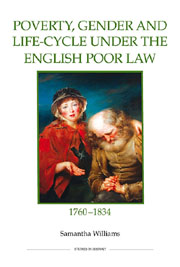Book contents
- Frontmatter
- Contents
- List of figures
- List of tables
- Dedication
- Acknowledgements
- Abbreviations
- Map 1 Bedfordshire, c.1834
- Introduction
- 1 People, place and poverty
- 2 Policy and paupers
- 3 Paying for poverty
- 4 Gender, life-cycle and the life-course
- 5 Work, unemployment and the makeshift economy
- Conclusion
- Bibliography
- Index
3 - Paying for poverty
Published online by Cambridge University Press: 05 February 2013
- Frontmatter
- Contents
- List of figures
- List of tables
- Dedication
- Acknowledgements
- Abbreviations
- Map 1 Bedfordshire, c.1834
- Introduction
- 1 People, place and poverty
- 2 Policy and paupers
- 3 Paying for poverty
- 4 Gender, life-cycle and the life-course
- 5 Work, unemployment and the makeshift economy
- Conclusion
- Bibliography
- Index
Summary
The relief of poverty at the parish level had to be paid for locally. The Elizabethan statutes of 1598–1601 made provision for the raising of poor rates by overseers of ‘every inhabitant and occupier of lands’ in the parish and they could distrain the goods of those refusing to pay. Overseers were responsible for estimating local need, the making of the rates and their collection, the distribution of poor relief, and the drawing up of the accounts, which were to be audited by the local magistrate. Overseers had to use their discretion in levying the rates and in the disbursement of poor relief. The acts imply that only a small proportion of parish inhabitants would need relieving and that the rest of the population could be rated, although, in practice, this is not what happened and far fewer inhabitants were actually assessed. The implementation of rating came earlier in towns and was much patchier in rural communities, but may well have been widespread even before the Civil war. There were disputes about who was liable to be rated and about whether liability should be based upon ability to pay, as judges suggested, or the value of land or houses owned or occupied, as came to be the general practice. As Steve Hindle has shown, the setting of the poor rate could be subject to disorder. The operation of the poor law was thus a constant process of negotiation between overseers and inhabitants as ratepayers, as well as between overseers and the parish poor.
- Type
- Chapter
- Information
- Publisher: Boydell & BrewerPrint publication year: 2011



